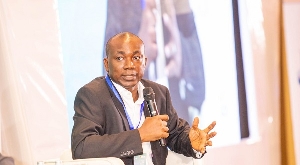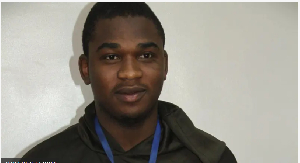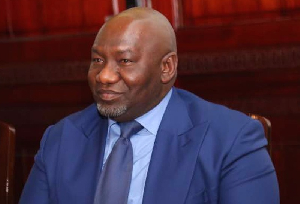The first Vice-Chancellor of the University for Professional Studies (UPSA), has argued that students who make the best grades, often do not end up as leaders.
According to Prof. Joshua Alabi, best grade scholars, are rather used to create ideas, innovate, come out with the right results, but they are led in higher positions by those who came behind them while in school.
But Prof. Alabi, was quick to remind the youth not to rescind their decision to learn and make the best grades because of his observation.
Professor Alabi, said this when he attended the first Young Leaders Ghana (YLG) lecture series; a network of young professionals in diverse fields, focused on promoting excellence in public and private service.
He said, “Very intelligent people with very little social or people skills, as well as lack of management expertise, often do don’t become leaders, because they don’t understand the dynamics of the contest and how to make better things happen”.
Often, very intelligent people like the First Class scholars, or First Class graduates, remain technocrats, while those with the right skills mix become leaders. It is not true that if you are a First Class scholar, then you are a leader, God has given you yours. Am not saying you should go and reduce your grades”, he said.
The First Vice-Chancellor of UPSA, who is known to have turned the fortunes of the then Institute into a world class university, believes leadership is not “the obsession to rule, so some people it is like I must rule and rule at all cost, it’s not about that, or to be in front all the time, no, it is about the ability to make impact”.
The economist cum marketer said, it is also not about leading people, but the skill to sell or communicate an idea to the people to buy into it. The one time politician, who served in various capacities under the then National Democratic Congress (NDC) headed by president Jerry Rawlings said, leadership comes in many forms.
Leadership, he argued requires transparency, they see what others do not see, they have the vision to take their people forward. “True leaders must not be obsessed to rule but with ability to bring positive change. Leadership is the cause, all other things is the effect.
Getting into leadership position that is not a birthright or by appointment, requires communicating ideas that offer others a promise of value that they believe you can make an impact in their lives.
Telling people about the ideas that you offer them, may not put you in leadership position to start with, however, when a well communicated promise of value, gets the person into leadership position, what is expected, is how to deliver the expected values”, he said.
Sharing how his administration managed to turn the fortunes of the University around, Prof. Alabi said, they had a plan to introduce new courses and additional programmes that could fetch them enough money for the expansion projects they had wanted to do.
But before they could have that, they had to show their bankers their proposal, so they could fund the infrastructural aspect so that they pay at an agreed period, after completion of infrastructure and admission of students. He said, the idea which looked good on paper was accepted and within a record time, the infrastructure was delivered and the money paid to the bankers.
This he said, was as a result of leaders who knew what they were about. Sadly he said his counterparts in the other universities did not see nor understood the vision behind the sudden changes in the university.
“This is how the leadership sat and developed a formula to build the university. With this formula and credibility, we realized that at any point in time when they finish, and they handed to us, within the year we finished [paying]”, Prof. Alabi noted.
According to him, at some point, he was called by these authorities accusing him of drawing money from the government of John Mahama to finance the infrastructure projects.
“So a lot of leaders in other universities normally they call and tell me because my party was in government; they have given me money that’s why I have built all that. Then I told them, you better come and learn from what we are doing”, he playfully said amidst laughter and applause from the students.
He decried the unfortunate culture crippling into Ghanaians where good work is not appreciation saying “Nobody wants to give credit where it is due so they find reason but the students are aware of all that we did and they are happy”.
Charging the students to prepare themselves before their set time to be leaders, Prof Alabi, who was accompanied by his wife, Prof. Gloski Alabi said, although they had no money at the time, they had time, so they utilized it to get the university work done.
“When we decided to transform the University of Professional Studies, we had no money but the first resource available was time”, he said.
Onetime rector, lecturer of the University said, there was an on-going modern auditorium, which is bigger than the Accra International Conference Centre (AICC) which can be managed for profit gains.
“We built the system to the extent that by the time I left the university, we started the construction of a modern auditorium, which is going to be bigger than the Accra International Conference Centre.
A four thousand seating capacity auditorium, by UPSA which can be managed, to generate income, for the University”.
The 2015 Chartered Institute of Bankers (CIB) man, who transformed the former institute to a fully-fletched university said, “apart from that project that was on-going, we paid everything that the bankers gave us and left a cash amount of GH¢16million”.
Prof Alabi, onetime Member of Parliament for Krowor in the Greater Accra Region, rose through the ranks at UPSA as lecturer, founding head of the Marketing Department, Dean of Faculty of Management Studies, Pro-Rector, Acting Rector, Rector, chaired several committees before becoming the vice-chancellor.
The lecture dub, “The Legacy Lecture Series” was held at the Conference Hall of the Vice Chancellor’s Ghana in Accra.
General News of Wednesday, 10 May 2017
Source: The Herald













